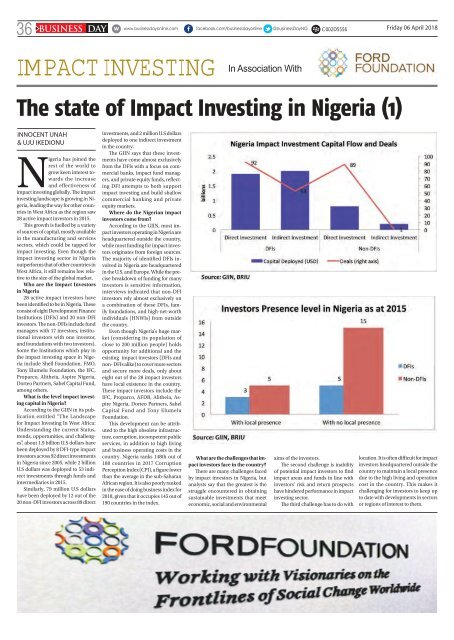BusinessDay 06 April 2018
You also want an ePaper? Increase the reach of your titles
YUMPU automatically turns print PDFs into web optimized ePapers that Google loves.
36<br />
BUSINESS DAY<br />
C002D5556<br />
Friday <strong>06</strong> <strong>April</strong> <strong>2018</strong><br />
IMPACT INVESTING<br />
In Association With<br />
The state of Impact Investing in Nigeria (1)<br />
Innocent Unah<br />
& Uju Ikedionu<br />
Nigeria has joined the<br />
rest of the world to<br />
grow keen interest towards<br />
the increase<br />
and effectiveness of<br />
impact investing globally. The impact<br />
investing landscape is growing in Nigeria,<br />
leading the way for other countries<br />
in West Africa as the region saw<br />
28 active impact investors in 2015.<br />
This growth is fuelled by a variety<br />
of sources of capital, mostly available<br />
in the manufacturing and services<br />
sectors, which could be tapped for<br />
impact investing. Even though the<br />
impact investing sector in Nigeria<br />
outperforms that of other countries in<br />
West Africa, it still remains low relative<br />
to the size of the global market.<br />
Who are the Impact Investors<br />
in Nigeria<br />
28 active impact investors have<br />
been identified to be in Nigeria. These<br />
consist of eight Development Finance<br />
Institutions (DFIs) and 20 non-DFI<br />
investors. The non-DFIs include fund<br />
managers with 17 investors, institutional<br />
investors with one investor,<br />
and foundations with two investors).<br />
Some the Institutions which play in<br />
the impact investing space in Nigeria<br />
include Shell Foundation, FMO,<br />
Tony Elumelu Foundation, the IFC,<br />
Proparco, Alitheia, Aspire Nigeria,<br />
Dorteo Partners, Sahel Capital Fund,<br />
among others.<br />
What is the level impact investing<br />
capital in Nigeria?<br />
According to the GIIN in its publication<br />
entitled “The Landscape<br />
for Impact Investing In West Africa:<br />
Understanding the current Status,<br />
trends, opportunities, and challenges”,<br />
about 1.9 billion U.S dollars have<br />
been deployed by 8 DFI-type impact<br />
investors across 92 direct investments<br />
in Nigeria since 2005, while 2 billion<br />
U.S dollars was deployed to 53 indirect<br />
investments through funds and<br />
intermediaries in 2015.<br />
Similarly, 79 million U.S dollars<br />
have been deployed by 12 out of the<br />
20 non-DFI investors across 89 direct<br />
investments, and 2 million U.S dollars<br />
deployed to one indirect investment<br />
in the country.<br />
The GIIN says that these investments<br />
have come almost exclusively<br />
from the DFIs with a focus on commercial<br />
banks, impact fund managers,<br />
and private equity funds, reflecting<br />
DFI attempts to both support<br />
impact investing and build shallow<br />
commercial banking and private<br />
equity markets.<br />
Where do the Nigerian impact<br />
investors come from?<br />
According to the GIIN, most impact<br />
investors operating in Nigeria are<br />
headquartered outside the country,<br />
while most funding for impact investors<br />
originates from foreign sources.<br />
The majority of identified DFIs involved<br />
in Nigeria are headquartered<br />
in the U.S. and Europe. While the precise<br />
breakdown of funding for many<br />
investors is sensitive information,<br />
interviews indicated that non-DFI<br />
investors rely almost exclusively on<br />
a combination of these DFIs, family<br />
foundations, and high-net-worth<br />
individuals (HNWIs) from outside<br />
the country.<br />
Even though Nigeria’s huge market<br />
(considering its population of<br />
close to 200 million people) holds<br />
opportunity for additional and the<br />
existing impact investors (DFIs and<br />
non- DFIs alike) to cover more sectors<br />
and secure more deals, only about<br />
eight out of the 28 impact investors<br />
have local existence in the country.<br />
These impact investors include the<br />
IFC, Proparco, AFDB, Alitheia, Aspire<br />
Nigeria, Dorteo Partners, Sahel<br />
Capital Fund and Tony Elumelu<br />
Foundation.<br />
This development can be attributed<br />
to the high obsolete infrastructure,<br />
corruption, incompetent public<br />
services, in addition to high living<br />
and business operating costs in the<br />
country. Nigeria ranks 148th out of<br />
180 countries in 2017 Corruption<br />
Perception Index (CPI), a figure lower<br />
than the average in the sub-Saharan<br />
African region. It is also poorly ranked<br />
in the ease of doing business index for<br />
<strong>2018</strong>, given that it occupies 145 out of<br />
190 countries in the index.<br />
What are the challenges that impact<br />
investors face in the country?<br />
There are many challenges faced<br />
by impact investors in Nigeria, but<br />
analysts say that the greatest is the<br />
struggle encountered in obtaining<br />
sustainable investments that meet<br />
economic, social and environmental<br />
aims of the investors.<br />
The second challenge is inability<br />
of potential impact investors to find<br />
impact areas and funds in line with<br />
investors’ risk and return prospects<br />
have hindered performance in impact<br />
investing sector.<br />
The third challenge has to do with<br />
location. It is often difficult for impact<br />
investors headquartered outside the<br />
country to maintain a local presence<br />
due to the high living and operation<br />
cost in the country. This makes it<br />
challenging for investors to keep up<br />
to date with developments in sectors<br />
or regions of interest to them.


















